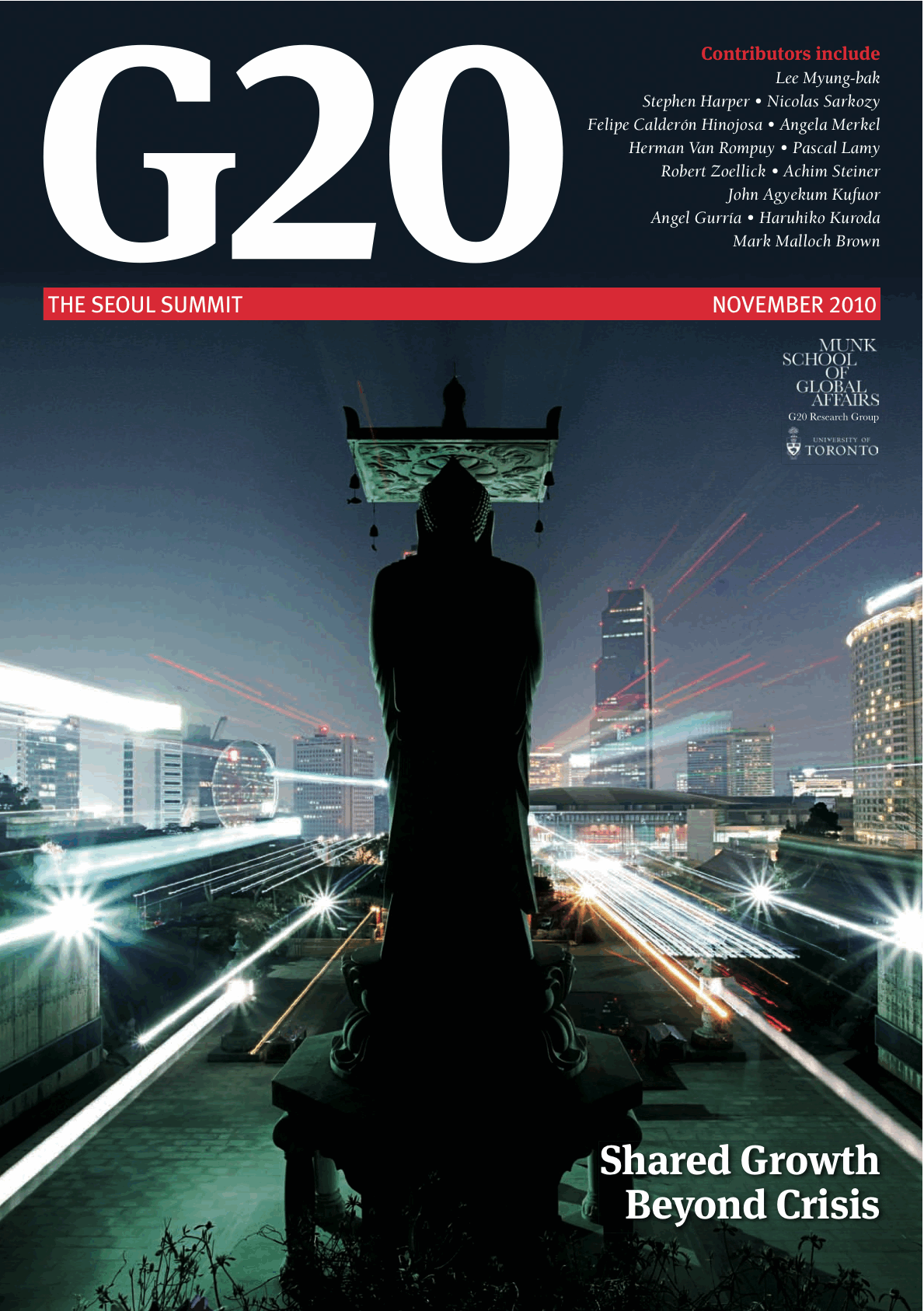

 |
 |
|

By Luis Alberto Moreno, president, Inter-American Development Bank
Strong growth is forecast in Latin America and the Caribbean, which have seen gradual and sustained development over the past two decades. The contribution of developing countries is essential for continuing global economic growth
To download a low-resolution pdf, click here. (Be patient! It's 50 MB.)
Strong growth is forecast in Latin America and the Caribbean, which have seen gradual and sustained development over the past two decades. The contribution of developing countries is essential for continuing global economic growthThe G20 continues to evolve as the world’s premier forum for international economic cooperation. Given the need to promote growth in the global economy, it is entirely appropriate for the G20 to turn its attention to the development agenda. Global growth is now driven by developing economies, including from Latin America and the Caribbean. Keeping developing countries growing and contributing to the global economy requires meeting challenges that the G20 can help address. The forecast for growth in Latin America and the Caribbean is very strong — averaging 4.5 per cent this year, twice the estimated rate of the United States and four times faster than the eurozone. Fiscal deficits in Latin America are expected to average 2.3 per cent of gross domestic product in 2010, compared to 6.8 per cent in the euro area and 10.6 per cent in the United States. This role reversal is no accident. Over the past 20 years the region has undergone a quiet but profound transformation.
Brazil is the best-known case: powered by industrial and agricultural production, it suffered only a brief disruption of its quick growth and has lifted tens of millions of its citizens out of extreme poverty. Despite a powerful and destructive earthquake in February 2010, Chile remains a fixture of growth and social progress. Other countries in the region echo these impressive performances. The earthquake in Haiti on 12 January 2010 led to an unprecedented international response to a major humanitarian crisis, with Latin American and Caribbean countries playing a major role in the effort.
This combination of economic and social success stems from political stability and fiscal reform in much of the region. Having weathered the financial crisis, Latin America and the Caribbean now have the opportunity to join Asia in leading a global economic recovery. To do so, however, the region’s governments will have to tackle several long-entrenched problems.
One of these is education. Latin America and the Caribbean can take pride in having achieved the Millennium Development Goal (MDG) of near-universal primary school enrolment. A growing percentage of children in the region complete high school and have a chance to attend university. However, most Latin American countries still score near the bottom of international standardised tests. To finish the job, Latin America must continue expanding the coverage and improving the quality of education. It must start teaching its students 21st-century skills.
The Inter American Development Bank (IADB) is working on early childhood development, the transition from school to work and the quality of teachers. Increasing the quality of and access to services levels the playing field for all children upon entering primary education. The IADB is focusing on readiness to learn, with the goal of narrowing the striking disparities in children’s learning capabilities. Its research has found that Latin American and Caribbean countries need to strengthen their secondary school curricula by ensuring that they are relevant to and aligned with the needs of the labour market, thus providing disadvantaged youths with skills that will make them more employable and making their economies more competitive.
What happens in the classroom must also change. Teachers are the most important factor in improving student achievement and reducing the learning gap among children from different backgrounds. The IADB is helping countries shape policies designed to attract bright young people into the teaching profession, particularly to work in failing schools, and to improve their teaching methods.
These focused interventions to improve education — predictive not only of academic performance but also of future earnings and general well-being — can become powerful policy levers for governments to arrest the intergenerational transmission of poverty.
A second major task is improving economic productivity. Latin America and the Caribbean need to use their existing resources and investments more effectively.
Productivity is falling behind in manufacturing and services, and even in agriculture.
To make productivity gains, the region must lower its transportation costs. Freer trade helps boost productivity, but as tariff barriers have fallen, transportation costs are now often much more important considerations. The region’s countries face higher freight rates in exporting to the United States and Canada than do East Asian or European countries. Local ports and airports are grossly inefficient. Part of the solution is further investment, but it is even more important to improve regulations, competition, information systems and operating procedures. The IADB estimates that a 10 per cent reduction in transportation costs would produce a 21 per cent return on investment in increased intraregional trade.
The G20 development agenda could be helpful in highlighting the importance of investing in regional and cross-border infrastructure projects. The IADB is committed to tripling its financial commitment for integration and trade-related programmes in the next five years.
Deepening Latin American and Caribbean credit markets, improving tax and social policies, and promoting innovation will also help boost productivity in the region. The G20’s ongoing work on regulatory reform and global economic safety nets will help on all counts. The IADB continues to provide financing and technical assistance, supporting the development of local credit and financial markets and the introduction of effective and
Brazil is powered by industrial and agricultural production. The country’s successful sugarcane ethanol industry owes much to massive investment socially balanced tax systems in the region.
A third challenge is energy. Latin America and the Caribbean must continue to expand their energy resources. Latin America generates some of the world’s cleanest energy. More than 65 per cent of its electricity comes from zero-emission hydroelectric sources, and it is a leading producer of sustainable biofuels. But in recent years, severe droughts have depleted key reservoirs, while fossil fuel production is flat or declining in Mexico and Venezuela. The region needs to develop new sources of energy and fully embrace reforms that would allow natural gas to flow freely across its borders. The G20 can help provide greater clarity on the future of climate finance and deepen the post-Copenhagen work plan on climate change in advance of the climate meetings in Cancun in November and December 2010. The IADB is committed to expanding its financing for sustainable development and climate change initiatives to 25 per cent of its total lending in the coming years.
Thanks to the support of its members and G20 leaders, the IADB secured a general capital increase early in 2010. Reducing poverty and inequality demand a strategic approach to address these priorities effectively across sectors, both in public and private operations. In that sense, the capital increase is more than an injection of resources; it lays out a strategic vision for the IADB for the next decade. It provides an accountability framework for measuring its performance vis-à-vis the needs of its borrowers and the expectations of all its members.
|
This Information System is provided by the University of Toronto Library |
All contents copyright © 2024. University of Toronto unless otherwise stated. All rights reserved.